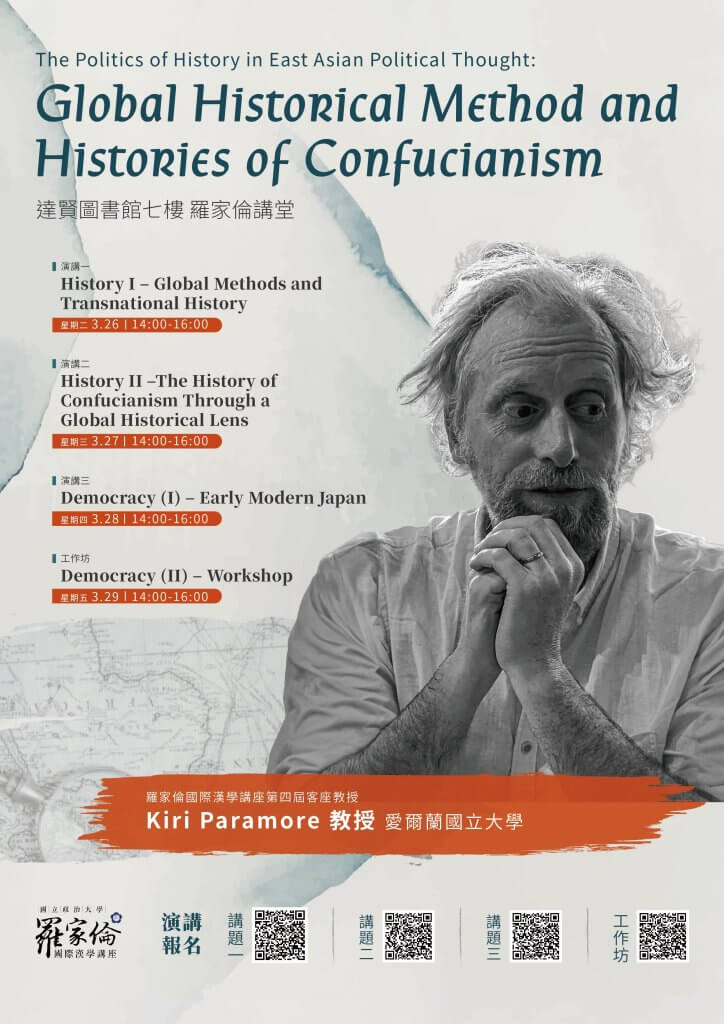第四屆客座講座教授
Kiri Paramore |愛爾蘭國立大學教授
2023年,有幸邀請到日本東京大學渡邊浩教授成為第四屆羅家倫國際漢學講座主持人,並舉辦「日本與中國:思想史的冒險之旅」系列講座,而今,2024年邀請到羅家倫國際漢學講座第四屆客座講座教授Kiri Paramore教授進行演講,延續並開展渡邊浩教授之講題。
※各場次演講將邀請相關領域之教授協助溝通翻譯。
系列演講綱要:
Despite having existed in ongoing processes of historical change for at least the last 2500 years, the intellectual traditions of East Asia are often discussed with relatively little attention to historical method and theory. These four sessions focus on applying historical method to the history of East Asian intellectual tradition, and notably Confucianism. The first session focuses on contemporary approaches to global history, engaging with issues like periodization, early modernization, multiple modernities and post-colonial historiography, in terms of how they might affect our thinking on East Asian thought. The second session focuses more directly on how these methods might be applied to the study of East Asian political thought, using the transnational history of Confucianism to bring paradigms from East Asian thought like the identity of the gentry, into dialogue with modern historiographical concepts like the formation of civil society, the birth of publicness, the industrious and industrial revolutions, etc. The contents of these first two sessions draw on my current writing for the Cambridge History of Confucianism.
The final two sessions take the topic of Democracy as a case study where we then attempt to apply historical methodologies to one particularly politicized aspect of political thought. In the third session I use my forthcoming chapter about early modern Japan in the Cambridge History of Democracy to demonstrate the application of this historical method to one political concept in the history of one particular place and period. In the fourth session, the workshop, I invite participants to join me in similarly considering the role of East Asian thought in democratic thinking in other places and periods in East Asia, including Taiwan. I would hope in this session to draw attention to the utility of postcolonial approaches to history in thinking about East Asian thought. The overarching aim is to illustrate the analytic power that more recent historical methodology gives to considerations of political thought.
演講(一) History I – Global Methods and Transnational History
- 講師:Kiri Paramore|客座講座教授 愛爾蘭國立大學教授
- 主持人:政治系葉浩教授
- 時間:03/26(二) 14:00-16:00
- 地點:達賢圖書館七樓羅家倫講堂
The first two sessions are related to my current work on the forthcoming Cambridge History of Confucianism. A major theme in that work is the diversity of East Asian political thought and its relationship to the diverse histories through which Confucianism developed differently in different parts of East Asia at different times. This first session sets the stage for that analysis by considering some major currents in global history related to issues like periodization and progress, particularly those related to multiple modernities and colonialism. In doing so, we seek to provide some alternative historiographical methods to the typical narrative of nation-state or empire -centred linear teleological progress through which East Asian thought is too often analysed. Acknowledging that in history the real world is not made up only of “empires” and “nations”, and that “progress” does not always follow the same paths, empowers us to begin reforming our ideas of “East Asian thought”, “Chinese philosophy” and “Confucianism”.
演講(二) History II –The History of Confucianism Through a Global Historical Lens
- 講師:Kiri Paramore|客座講座教授 愛爾蘭國立大學教授
- 主持人:哲學系王華教授
- 時間:03/27(三) 14:00-16:00
- 地點:達賢圖書館七樓羅家倫講堂
This session uses the up-to-date consideration of global historical method of the first session to reframe the history of Confucianism in global terms. Starting from pre-history, and stretching to the present, we will touch upon a number of key points in the development of East Asian political thought as they played out in different polities across the world. Importantly, we will look to contextualize those developments in global history, both using global history method to adjust our understandings of the history of thought, and using East Asian ideas from those periods to critically reflect back on some aspects of the way we see global history.
演講(三) Democracy (I) – Early Modern Japan
- 講師:Kiri Paramore|客座講座教授 愛爾蘭國立大學教授
- 主持人:哲學系馬愷之教授
- 時間:03/28(四) 14:00-16:00
- 地點:達賢圖書館七樓羅家倫講堂
This session is a case study which zooms in on the particular case of one important current political concept, democracy, in the history of one country, in this case Japan. Through an analysis of democratic ideas in medieval, and particularly early modern Japan, we show how historical method’s application to East Asian thought can be used both to deepen our understanding of the development of East Asian thought, and to reflect critically on current historical and political ideas – in this case, the idea of democracy.
工作坊 Democracy (II) – Workshop
- 講師:Kiri Paramore|客座講座教授 愛爾蘭國立大學教授
- 主持人:中研院藍弘岳教授
- 與談人:中研院陳嘉銘教授
- 時間:03/29(五) 14:00-16:00
- 地點:達賢圖書館七樓羅家倫講堂

